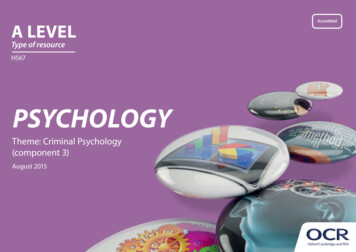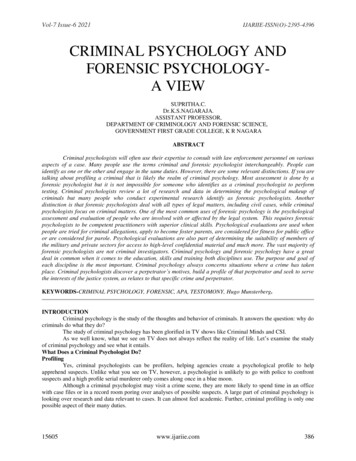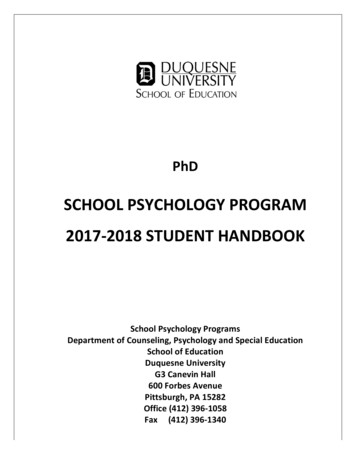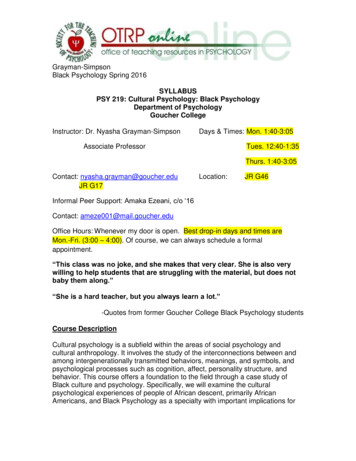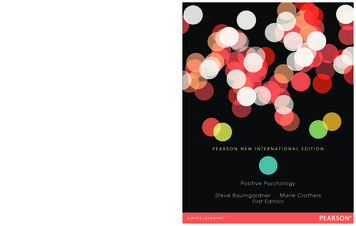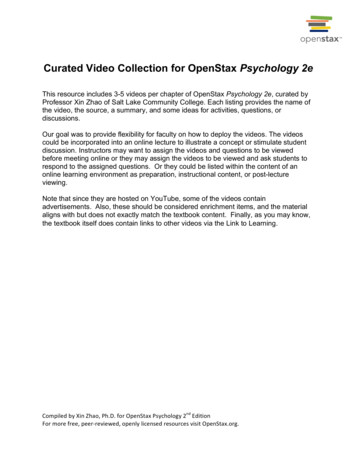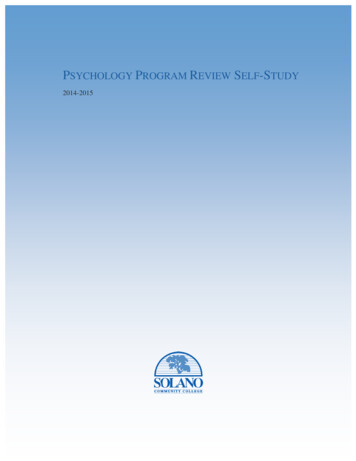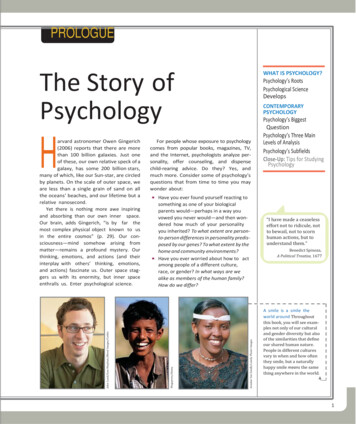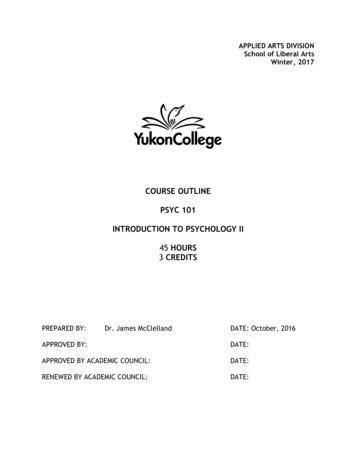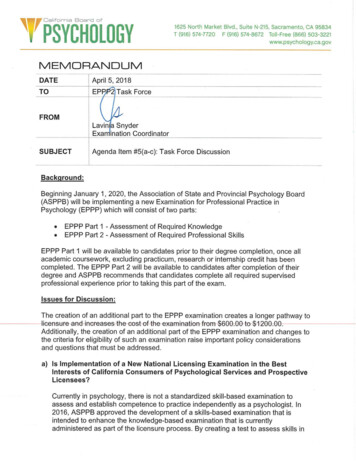
Transcription
rCalifornia Board ofPSYCHOLOGY1625 North Market Blvd., Suite N-215, Sacramento, CA 95834T (916) 574-7720 F (916) 574-8672 Toll-Free (866) 503-3221www.psychology.ca.govMEMORANDUMDATEApril 5, 2018TOEP 2}Task ForceII\. FROMLavin a SnyderExamination CoordinatorSUBJECTAgenda Item #5(a-c): Task Force DiscussionBackground:Beginning January 1, 2020, the Association of State and Provincial Psychology Board(ASPPB) will be implementing a new Examination for Professional Practice inPsychology (EPPP) which will consist of two parts: EPPP Part 1 - Assessment of Required KnowledgeEPPP Part 2 - Assessment of Required Professional SkillsEPPP Part 1 will be available to candidates prior to their degree completion, once allacademic coursework, excluding practicum, research or internship credit has beencompleted. The EPPP Part 2 will be available to candidates after completion of theirdegree and ASPPB recommends that candidates complete all required supervisedprofessional experience prior to taking this part of the exam.Issues for Discussion:The creation of an additional part to the EPPP examination creates a longer pathway to- - - - - lieens1:1re--and-iAereases-the east 0f- tl le-examiAati0n-fF0m 680:08-to -208.00.Additionally, the creation of an additional part of the EPPP examination and changes tothe criteria for eligibility of such an examination raise important policy considerationsand questions that must be addressed.a) Is Implementation of a New National Licensing Examination in the BestInterests of California Consumers of Psychological Services and ProspectiveLicensees?Currently in psychology, there is not a standardized skill-based examination toassess and establish competence to practice independently as a psychologist. In2016, ASPPB approved the development of a skills-based examination that isintended to enhance the knowledge-based examination that is currentlyadministered as part of the licensure process . By creating a test to assess skills in
addition to the current test to assess knowledge, ASPPB intended this examinationto provide licensing boards the option of an enhanced EPPP that offered astandardized, reliable and valid method of assessing competence. The EPPP2examination is the skills examination that ASPPB developed. More information onASPPB's rationale for creating the EPPP2 and the process they used to develop theEPPP2 are provided in Attachment A.b) Should the Board Allow ASPPB to Determine Eligibility for Taking the NationalExamination for California Applicants? Should There Be Different EligibilityCriteria?For purposes of comparison, the table below demonstrates how the Board ofPsychology and three other California healing arts boards determine or cededetermination for eligibility for the respective national examination.BoardBoard of PsychologyDental Board ofCaliforniaBoard of BehavioralScience (BBS)Medical Board ofCaliforniaExamination ReauirementTo become a licensed psychologist, individual must apply to theBoard, take and pass the National Exam (Examination forProfessional Practice in Psychology (EPPP)) and State exam(California Psychology Laws and Ethics Examination (CPLEE)) andpay all applicable fees. To qualify for the EPPP individual must havea qualifying doctorate degree in psychology and at least 1500 hoursof supervised professional experience (SPE). To qualify for theCPLEE one must pass the EPPP, complete a total of 3000 hours ofSPE.To become a Dentist, the Board has four (4) license pathways, theyare as follows: Requires no examination of any kind. Licensure is bycredential. Require the Western Regional Examining Board (WREB)examination (clinical, not administered by the Board) andjurisprudence examination (not administered by Board), Require a competency portfolio "exam" (administered by thedental school) and jurisprudence examination (notadministered by the Board), Require completion of a post-degree residency program and t ie-complelion-of-a-jurispruc:\ence-examinalion- a§ain,n0tadministered bv the Board).LCSW's (Licensed Clinical Social Worker) and LPCC's (LicensedProfessional Clinical Counselor) apply directly with the Associationof Social Work Boards (ASWB) or the National Board of CertifiedCounselors (NBCC) to take the national exam after BBS hasannroved them to do so.Physicians must take and pass all three steps of the USMLE (UnitedStates Medical Licensing Examination) to qualify for alicense. There are a couple of other options for examinations thatcandidates could have taken in the past, as well as other pathwaysthat they can use to obtain a license, but the USMLE is the mainone.Applicants apply for the examination directly through USMLE andthe Medical Board has no nart in that process. Medical Board'
requires the results be provided directly to the Medical Board fromUSMLE when an applicant applies.No state exam.c) How Would California Licensing Requirements Be Impacted if ASPPB AllowsCandidates to Directly Register for and Take the EPPP (Part 1) Prior toGraduation and Completion of 1,500 Hours of SPE?According to ASPPB not all academic programs, internships or post-doctoralresidencies are APA or CPA accredited. Students from a non-APA or CPA programconsistently underperform on the EPPP when compared to the average student froman accredited doctoral program. ASPPB values graduating students from an APA orCPA accredited program and feel the accreditation should be the minimumrequirement for doctoral level licensure.With the enhanced EPPP, applicants who are in a APA/CPA doctoral program willhave the ability to apply directly to ASPPB to take the EPPP Part 1 once allacademic coursework, excluding practicum, research or internship credit has beencompleted. The EPPP Part 2 will be made available to candidates after completionof their degree and ASPPB recommends that candidates complete all requiredsupervised professional experience prior to taking this part of the exam.Section 2914 of the Business and Professions Code, requires an applicant tocomplete a doctoral degree in Psychology or Educational Psychology or inEducation with a field of specialization in Counseling or Educational Psychologyfrom a school that is accredited by a national or regional accrediting agency. Toqualify to take the EPPP, students must apply to the Board; complete an acceptabledoctoral degree as defined in Section 2914 of the B&P code and 1500 hours ofSupervised Professional Experience.Currently the Board's laws and regulations do not prevent applicants from applyingdirectly to ASPPB and taking the exam before meeting California's requirements orseeking Board approval. The regulation is also not clear if we can accept two examscores for the EPPP. Regulation section 1388 only specifies the applicant must take----------- ts-one-score:--With-the-enhance,.J---- EPPP, the Board would be receiving two exam scores. Can the Board accept bothscores based on regulations or does the regulation need to be amended to accountfor both parts of the EPPP exam.Allowing students who are in an APA/CPA doctoral program to apply directly toASPBB to take the EPPP creates an unfair disadvantage for students who attendschools that do not hold APA/CPA accreditation. Our statute only requires a degreefrom a regional accreditation or national accreditation. By creating this incentivestudents in CA may decide to choose an APA approved school as opposed to just aWASC accredited (regionally accredited) school because ASPPB would allow themto apply for the EPPP1. Attached is the Board's School Exam Statistics for the pastthree years for your reference.
Action Requested:Discuss the above policy considerations and issues, and provide a recommendation tothe Board.Attachment A: The EPPP Part 2 The Assessment of Skills needed for theIndependent Practice of PsychologyAttachment B: School Exam Results Data
Attachment AThe EPPP Part 2 The Assessment of Skills needed for the Independent ·Practice of Psychology'
The EPPP Part 2The Assessment of Skills needed for theIndependent Practice of PsychologyOctober 2017As5oc:111Uon of Smte 11nd Pro,,,incloJ Psydiology Bollrcls
The EPPP Part 2: The Assessment of Skills needed for theIndependent Practice of PsychologyTable of ContentsAn Overview of the Rationale for the EPPP Part 2 . 2Developing an Empirical Base for a Competency Model . 4Results of the Surveys and 2014 Competency Model: . 52016 Job Task Analysis .6ASPPB Competencies Expected of Psychologists at the Point of Licensure . 7Comparison of Competency Models . 8Assessment of Competence . 8ASPPB Pyramid for the Assessment of Competence . 9Reviewing Methodologies to Assess Competency . 10Computer-Based Testing Procedures . 10Review of Competency Assessment Procedures Used by Other Professions . 10The Timeline for Skills Assessment in Psychology . 11EPPP Part 2 Exam Development Outline . 12APPENDIX A:ASPPB Competencies Expected of Psychologists at the Point of Licensure . 15APPENDIX B: Comparison of Competency Models. 21
An Overview of the Rationale for the EPPP Part 2Assessing competence to practice independently is a critical function of psychologylicensing boards and colleges throughout the United States and Canada. Competence is theintegrated and habitual use of knowledge, skills, attitudes, and values in psychology. Theevaluation and establishment of competence is necessary to ensure the protection of the public.Establishing competence is the key to ensuring that a professional is capable ofpracticing as part ofthe profession safely and effectively (Rodolfa et al., 2005).A current component of the profession's assessment of readiness for independentpractice is a test of knowledge, the Examination for Professional Practice in Psychology(EPPP). The EPPP has served the profession well for over 50 years, but as the profession hasmoved toward embracing a culture of competence it has become clear that a standardizedmethod to assess the skills needed to practice independently is also required. Otherprofessions that embrace a culture of competence utilize knowledge-based and skills-based examsto determine readiness to practice independently.Currently there are a number of educational models used to train students in the fieldof psychology, many of which are accredited by the American Psychological Association (APA)and the Canadian Psychological Association (CPA). The APA and CPA accreditation systems donot require a prescribed course of education and training. Rather the focus of bothaccreditation systems is on ensuring that the core competencies for the profession are coveredas opposed to prescribing the means by which they are covered. Thus, there is diversity in howstudents are trained, resulting in sometimes vastly different levels of knowledge and skills instudents. ASPPB values these accreditation systems, and in fact has endorsed the position that" . graduation from an APA or CPA accredited program should be a minimum requirement fordoctoral level licensure for health service providers".It should be noted that accreditation systems accredit training programs, nOtindividuals. As licensing boards license individuals, it is their duty to assure the public that eachindividual who is licensed is competent to practice independently.Evidenc:e-0f-a lack of standardiz-ation-in-t,F-aining e-a n be-seen in the range-of EPPP passrates for APA/CPA-accredited programs, which ranges from 13% to 100% (ASPPB, 2016).Additionally, as can be seen from summary data on the APPIC Application for PsychologyInternship, there is great variability in the type and quantity of practicum experiences that arerequired by accredited programs (APPIC, 2015, 2016). This variability in training model s andexperiences results in students accruing anywhere from a few hundred hours, to severalthousand hours of practicum experience.Not all academic programs, internships or post-doctoral residencies are APA/CPAaccredited; thus, some individuals who become licensed have received training from program sthat have not been reviewed by an external agency. Students from these academic programs2
consistently underperform on the EPPP when compared to the average student from anaccredited doctoral program (Lightfoot, Rodolfa & Webb, 2016). This raises questions about theeffectiveness of the training provided by these programs, and suggests the importance ofprograms being reviewed by an external agency.Concern regarding the reliability and validity of supervisor written assessments oftrainees has been raised for years, and it has been demonstrated that supervisors tend tooverestimate their supervisees' competence (e.g., Gonsalvez, 2007; Miller, Rodney, VanRybrock & Gregory, 1988). This tendency is perhaps the result of the inherent conflict of beingin gatekeeper and mentor roles simultaneously. The problem of supervisors overvaluing thecompetence of their supervisees led APPIC to change its format for intern letters of evaluationto encourage a more accurate evaluation of competence. APPIC requires supervisor letters toaddress the strengths and weaknesses of their trainees as opposed to a general statement oftheir performance. The issues of variability in ratings, a lack of standardization in the evaluativeprocess, and the questionable validity of supervisor ratings make it difficult for licensing boardsto attest to the competence of the psychologists they license. The EPPP Part 2 will provide anindependent, standardized, reliable, and valid assessment of the skills necessary forindependent practice.Critically, the profession of psychology's move towards a "culture of competence" hasresulted in essential agreement among key stakeholder groups (e.g., APA's CoA, CPA's AP,ACPRO and ASPPB) regarding the necessary competencies for independent practice. Thisessential agreement was a necessary precondition to developing a skills examination. Lastly,the technology is now available to assess skills via a computer based examination, rather thanthe costlier and time-consuming examination using either real or standardized patients. Thus,ASPPB concluded that it is the optimal time to develop a standardized examination to assessthe functional skills necessary for independent practice.In January 2016, the Board of Directors {BOD) of the Association of State andProvincial Psychology Boards {ASP PB) approved the development of a skills-based exam.The skills exam will enhance the knowledge-based examination that is currentlyadministered as part of the licensure process. The first part of the new and enhanced EPPP willbe the knowledge-based exam, the current EPPP, and the second part will be the skills- based(functional skills) exam, the EPPP Part 2. With a test to assess skills in addition to the currenttest to assess knowledge, licensing boards will have available to them an enhanced EPPP thatwill offer a standardized, reliable and valid method of assessing competence.This document provides an overview of the development of the EPPP Part 2.3
Developing an Empirical Base for a Competency ModelThe historical efforts of the competency movement propelled the profession ofpsychology forward in its development of a conceptual basis for a competencies framework.ASPPB's initial attempt to use empirica l evidence to inform the development of a competencymodel occurred in 2009 with the work of the ASPPB Practice Analysis Task Force (PATF). Inaddition to the task of revalidating the knowledge domains ofthe EPPP, the PATF was chargedwith: 1) identifying and validating underlying professional competencies in psychology, and2) identifying assessment methods that would best measure these competencies. The goal ofthe EPPP practice analysis is to ensure that the exam reflects the knowledge necessary for competentpractice, and in doing so the public interest is protected.A competency model was proposed by the PATF based on the data obtained fromthe practice analysis. The PATF then developed a survey regarding the practicecompetencies identified in the model, and randomly sampled 4732 licensed psychologistsfrom across Canada and the United States. Psychologists were asked to rate and commenton the relevance to the practice of psychology, of 37 competency statements and 276behavioral exemplars in the following clusters: Scientific Knowledge Foundational competencieso Evidence-based decision making/critical reasoningclustero Interpersonal and cultural competence clustero Professionalism/ethics cluster Functional competencieso Assessment clustero Intervention/supervision/consultation clusterSurvey respondents were asked to indicate the frequency with which theyperformed each competency in their ractice during the p revious year, the degree to whicheach competency was critical for optimizing outcomes for clients, and the importance ofeach competency to their psychology practice during the previ ous year. Respondents werealso asked to comment on the point in their development at which a psychologist should beable to demonstrate each behavioral exemplar.Th e ASP PB Competency Model and results of the survey were described in thePra ctice Analysis Report (ASPPB, 2010) and in an article written by members of the PATF(Rodolfa et al., 2013). The full report of the Practice Analysis is available on the ASP PB website.4
In 2010, the ASPPB Board of Directors appointed a task force to investigate thepossibility of developing a method to assess functional skills. The Competency AssessmentTask Force (CATF} used the PATF competency model as the basis of its continueddevelopment of an ASP PB Competency Model for Licensure. It reviewed the competencymodel, carefully exploring the data generated in the PAFT survey and comparing the modelwith other competency models, including the competency model utilized in Canada that ispart of the Mutual Recognition Agreement (MRA}.The CATF developed criteria to focus the model to include only those competenciesand behavioral exemplars that are the most relevant and needed at the point of initiallicensure. The criteria chosen were based on empirical results from the PATF study. The CATFthen conducted an in-depth examination of each competency and its related behavioralexemplars, eliminating redundancies ·and rewording for clarity when necessary. This processresulted in a model with 6 competency clusters, 32 competencies and 97 behav ioralexemplars.Once this was completed, the CATF sought the opinions stakeholders, conductingtwo surveys of the revised model of competency:CATF Regulator Survey: The CATF surveyed the ASP PB membership to determineregulators' opinions regarding whether entry-level licensees/registrants should beable to demonstrate the 97 behaviors that defined in the model, and whether thesebehaviors are critical to public prot ection.CATF Training Director Survey: The CATF subsequently surveyed the Associationof Psychology Postdoctoral and Internship Centers (APPIC}m embersh ip (internship and postdoctoral residency training directors) and APPICsubscribers (academic program directors) regarding the competency model. Helpf ulratings were received about which behavioral exempla rs they felt trainees wereexpected to demonstrate at three different developmental levels (end of internship,end of postdoctoral residency, and post-licensure).Results of the Surveys and 2014 Competency ModelSeventy regulators from 42 jurisdictions in the United States (81%) and 6ju risdictions in Canadian (60%} provided empirical support for the majority of the model.The data from th e training director survey (N 216} substantially mirrored the results of theregulator survey, and also provid ed empirical support for the mod el. As a result of th esurvey fee dback, the CATF mad e further modifications to the proposed ASP PB CompetencyModel and eliminated the Supervision competency. The model, ASPPB CompetenciesExpected at the Point of Licensure, was approved by the AS PPB BOD in 2014.5
2016 Job Task AnalysisAnother job task analysis (also known as a practice analysis) was initiated in 2016to revalidate the knowledge base for the EPPP Part 1 and to validate the current form ofthe competencies model to be used to provide the blueprint for the new exam, the EPPPPart 2. The Job Task Analysis Advisory Committee with the assistance of the exam vendor(Pearson Vue) analyzed the results of survey responses received from 2736 licensedpsychologists from across Canada and the USA. The responses were used to formulate the2017 version of the ASPPB Competencies Expected at the Point of Licensure. Therespondents, all of whom were practicing psychologists rated the competencies in the modelaccording to whether or not they are needed at the point of licensure, as well as on thecriticality and utility of each. The results validate the original competency model, with theaddition of a Supervision competency. Changes were made to the structure of the originalcompetency domains based on the data received and the feedback of the expert panel advisingthe job task analysis. Thus, there are different names for some of the domains in this latestiteration of the model (e.g., Professional Practice is focu sed on two major areas of practice Assessment and Intervention; Systems Thinking has been broadened to include Collaboration,Consultation and Supervision). While most of the language of the competencies and behavioralexemplars was retained, some of the actual competencies and behavioral exemplars wererefined, moved, clarified and updated, or deleted based on the data received. The commentsbelow provide an overview, and Appendix A contains the updated ASPPB competency modelwhich was empirically based on the input from these various sources. This model wasapproved by the ASPPB BOD in February, 2017. A full report of the 2016 Job Task Analysis isavailable on the ASPPB website.6
2017 ASPPB Competencies Expected of Psychologistsat the Point of LicensureThe 2017 version of the competency model contains the following competency domains:I. Scientific orientation: This competency domain involves an orientation to the knowledgedeveloped through the science of psychology, including evidence-based practice, as wellas a scientific method of looking at and responding to psychological problems. Thisgeneral competency also involves the knowledge of the core areas of psychology, whichwill not be assessed by the new competency part of the EPPP as they are currently wellassessed by the Part 1 of the Examination for Professional Practice in Psychology.2. Assessment and Intervention: This competency domain involves the provision ofpsychological assessment and intervention services to the public.3. Relational competence: This competency domain includes the ability to engage inmeaningful and helpful professional relationships, as well as to understand and interactappropriately in a variety of diverse cultural and social contexts. It includes the two sub categories of diversity and relationships.4. Professionalism: This competency domain includes personal competence, the ability toidentify and observe the boundaries of competence and reflective practice, the ability tobe self-reflective and to receive feedback from others in relationship to one'spsychological activities.5. Ethical practice: This competency domain involves the ability to apply both the ethicalcodes of the profession and the laws and regulations that govern the practice ofpsychology.6. Collaboration, Consultation, and Supervision: This competency domain involves the abilityto understand and work with individuals within broader systems and includes the skillsto operate effectively and ethically within organizational structures, to collaborate withothers in a cooperative, multidisciplinary manner and to effectively and ethically providesupervision to students, trainees and other professionals.Appendix A contains a complete list of competencies and the behavioral exemplarsthat were identified within each competency cluster.7
Comparison of Competency ModelsA comparison of the competency clusters articulated in the current AS PPBCompetency Model (2017}, the competencies articulated in the Canadian MutualRecognition Agreement (MRA, 2004), and the competency model contained in the APACommission on Accreditation's (CoA) Standards ofAccreditation (2015) is presented inAppendix B. In comparing these three models, it is clear that there is substantial overlap atthe domain or cluster level of the models, as well as at the competency level. Thecomparison suggests that there is agreement among educators, practitioners, andregulators regarding the competencies required for the independent practice of psychology.Assessment of CompetenceMiller's Pyramid (1990} is an assessment framework that was designed for use in theassessment of practitioner clinical skills, and was developed for use by the ·p rofession of medicine.This framework was adapted by the CATF to describe the developmental process thatpsychologists go through as they establish the competence necessary for independentpractice. The CATF's adaptation of the Pyramid provides a simple representation of themanner in which the practice competencies develop, and provides a useful rubric for theirassessment. As displayed in Figure 1, the first and foundational stage in the pyramid is"KNOWS", the second is "KNOWS HOW", the third is "SHOWS HOW", and the fourth andfinal level is "DOES".The EPPP Part 1 is a test of core knowledge in the profession, and in essence forms thebase of the pyramid - "KNOWS." In this stage of competency development, the candidateknows information (e.g., the tenets that are part of a well-known theory of personalitydevelopment}, and can demonstrate this knowledge on the test. The next stage of competencydevelopment reveals that the candidate "KNOWS HOW" to do something {e.g., can state thebasic procedure for administering common intelligence tests and "apply" such information toan assessment situation). The EPPP Part 2 will be able to assess many of the competenciesrelated to the "KNOWS HOW" stage of competency development and a number of the- - - - - eempeteAcies-in-the-t:hird-s-t:age SH0W-S H0W {e:-g correctly-using-a-standard-score table-).Other competencies in the "SHOWS HOW" stage will need to be assessed through directobservation, either with an Objective Structured Clinical Examination {OSCE) or similar type ofassessment tool, or by enhanced supervisor assessments.It is important to stress that no single method can measure all of the competenciesneeded to practice psychology. Thus, the CATF discussed a number of other methods to assessa candidate's skills at each of the levels of the Pyramid. The CATF encouraged the developmentof enhanced competency-based supervisory evaluation forms and processes to be included inthe information provided to psychology licensing boards/colleges that demonstrates thecandidate's competency in term s of the "SHOWS HOW" stage.8
The "DOES" stage reflects the actual practice of psychology that may be assessed in anongoing way through practice or workplace audits. Epstein and Hundert's (2002) often quoteddefinition of competency sums up 'DOES" as the "habitual and judicious use of communication,knowledge, technical skills, clinical reasoning, emotions, values, and reflection in daily practicefor the benefit of the individual and community being served (p . 226) . Competence depends· on habits of mind including attentiveness, critical curiosity, self-awareness, and presence(p.228)." In the world of psychology licensing, however, assessment of the "DOES" stageremains a future endeavor.The CATF's adapted version of Miller's Pyramid for assessing competency for licensurein psychology is shown below.ASPPB Pvramld for th- Ms.essmen\ of Compel n eWorkptace AuditsPerformanceDirect ObservationEPPP Part2IntegratedKnowledge & SkillsEPPP Part2KnowledgeEPPPAdiJptedfrom Miller, 1(}909
Reviewing Methodologies to Assess CompetencyBased on a review of the literature and consideration of testing methods in otherprofessions, the two general methodologies that appeared to be the most appropriate for askills examination were computer-based testing and in-person testing. The CATF reviewed eachof the ASP PB competencies to determine how a skill might best be tested and determined thatthe majority of competencies could be sufficiently assessed by a computer-based, writtenexamination. When the ASPPB Competency Model changed as a result of the 2016 Job TaskAnalysis, the members of the EPPP Part-2 Implementation Task Force and the AS PPB Job TaskAnalysis Advisory Committee reviewed each of the competencies of the revised model. Basedon this review, it was again determined that the majority of the competencies could besufficiently assessed through computer-based testing.Computer-Based Testing ProceduresThere is extensive information available in the literature about the use of innovativeitem types that can be administered to candidates via computer to assess competence (Parshall& Harmes, 2007, Parshall & Harmes, 2008). These innovative item t ypes can be used to posethe "KNOWS HOW" questions and basic "SHOWS HOW" items as identified within the proposedassessment framework.The curren
an accredited doctoral program. ASPPB values graduating students from an APA or . CPA accredited program and feel the accreditation should be the minimum . requirement for doctoral level licensure. With the enhanced EPPP, applicants who are in a APA/CPA doctoral program will . have the ability to apply directly to ASPPB to take the EPPP Part 1 .


